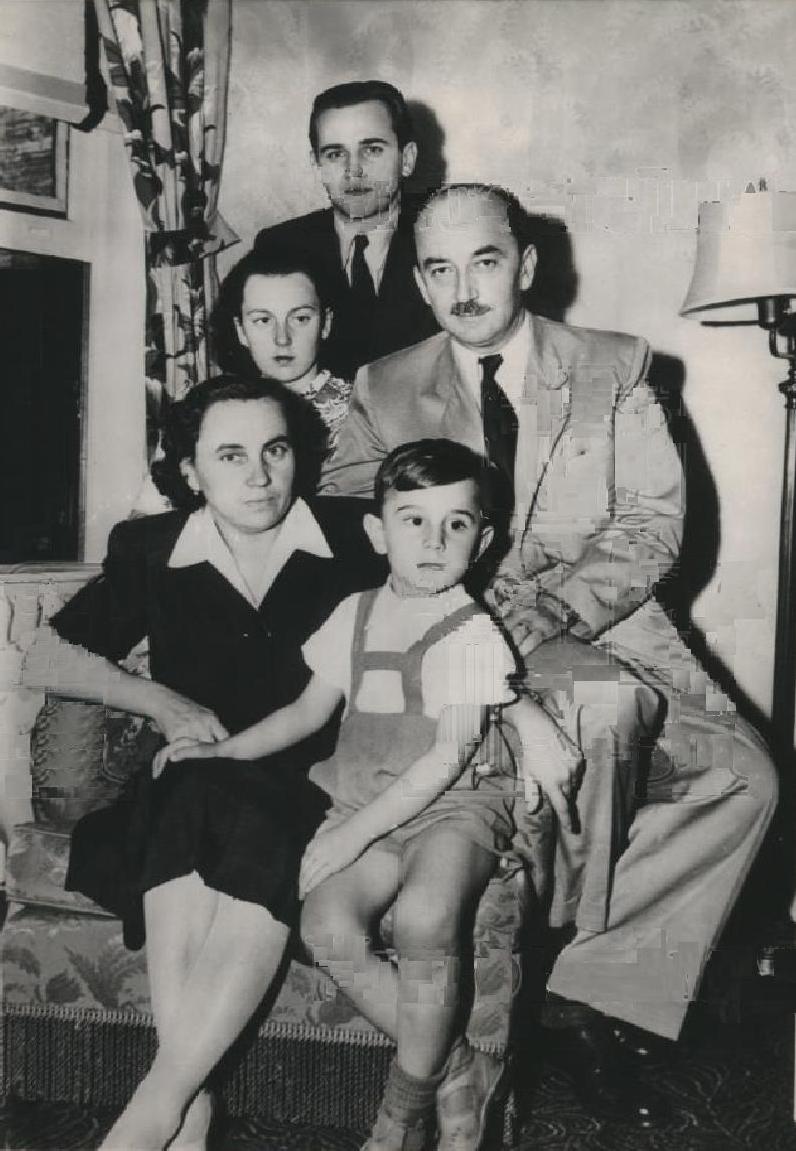
The Cold War: Communist Hungary (1947-56)

Figure 1.--As a result of Hungary's first democratic election, Ferenc Nagy became the compromise Prime Minister (February 1946). From the beginning, his major focus was on resisted the Hungarian Communist Party and its effot to establish a Party dictatorship. He was unwilling to become a puppet for a Soviet backed Communist police state. He was, however, forced to resign by the Soviet NKVD. Instead of arresting him, the NKVD kidnapped his little boy. The boy was returned unharmed after his disdraught father resigned. The Communist Party thus seized full control. The United States granted Nagy and his family assylum. Here is Nagy and his family, safely in a Washihgton, D.C. hotel. Here we see Mrs. Nagy, son Lazzlo 4 years), daughter Juliet (21), and Ferenc Nagy. Their older son, Ferenc Jr (21), is in back. The photograph is dated June 7, 1947.
|
|
Stalin after World War II did not immeitely install communist Governments. Rather he include some mooderate leftist parties in the first governments. We are not entirely sure what was runing through his mind. Perhaps he assumed thst Communist parties would be elected. Perhaps he wanted to avoid popular resistance. Coomunist partoes did not do well when free elections were permitted. When this did not occur, the Communists backed by the Red Army and NKVD gradually seized control by a variety of means, basically arresting people who resisted them and staging coups with varying degrees of violence and intimidation An important politican in the aftermth of the War was Ferenc Nagy (1903–79), a man of peasant origins. He led the Smallholders Party. He was chosen Speaker of the National Assembly (November 1945) in part because he was a compromise candidate between the Social Democrats and Communists. and a member of the High National Council (December 1945). As a result of Hungary's first democratic election, he became Prime Minister (February 1946). From the beginning, his major focus was on resisted the Hungarian Communist Party and its effot to establish a Party dictatorship. He was unwilling to become a puppet for a Soviet backed Communist police state an resisted Coomunist threats and intimidation. He was, however, eventually forced to resign by the Soviet NKVD. Instead of arresting him, the NKVD kidnapped his little boy. The boy was returned only after his disdraught father resigned. The Communist Party thus seized control. The United States granted him and his family assylum. The future of Hungary then became a contest between two competng versions of Communism. Imre Nagy spent years as a refugee in the Soviet Union. As Minister of Agriculture after the War he introduced a popular land reform program. Hungary had been dominted by large landed estates. Nagy was elected Speaker of the Hungarian Parliament (1947). He gradualy emerged as a leading spokesman for those with a liberal vision of Communism. Prime Minister Mátyás Rákosi (1892-71) understood Stalin's penchant for a more authoritarian approach as a way of cementing his control of Hungary. Like I. Nagy, he spent the Wa5r in the Soviet Union. He was anoited by Stalin as leader of Hungary's Communist Party from (1945). He was General Secretary of the Hungarian Communist Party (1945–1948) and holding the same post when for cosmetic reasons the Party was remamned the Hungarian Working People's Party--MDP (1948–1956). He was a hard Stalinist and loyal to Soviet Union to a degree notable even by Eastern European standards. He described himself as 'Stalin's best Hungarian disciple' and 'Stalin's best pupil'. This is horrifying if one knows anything about Stalin. He even promoted his own cult of cult of personality, just like Stalin. Rákosi dropped all pretense of democracy. He gave the non-Communist parties an ultimatum: cooperate with a new, Communist-dominated coalition government or face arest and go into exile. Rákosi dominated Hungary and imposed an increasingly authoritarian regime. Rákosi was one of the brutal dictators that Stalin had imposed on the people of Eastern Europe. Rákosi faithfully carried out orders from Moscow. He conducted a dreadful purge in Hungary beginning in 1950 and lasting until Stalin died in 1953. In a country of only about 10 million, 1.3 million were targetted , about half of which were arrested. Here I have seen varying estimates. There were 2,350 were executed. [Sebestyen] Rákosi was Jewish, even so he joined in Stalin's anti-Semetic campaign. Rákosi brutal rule was questioned from withn the Party and Rákosi responded by purging Party membership, expelling 200,000 for disloyalty or lack of sufficent loyalty. The Church was also targetted. Priests were arrested. They also arrested the bishop of Esztergom, Cardinal Mindszenty, and organized a show trial (1949). As in the rest of Soviet dominated Eastern Europe, the economic boom, Communists expcted did not occur. They could not, however, question socialism, not only were the devoted Markisrs, but qiestioning socilism would not have been tolerted by Stalin. Rákosi tolerated Nagy for several years, in part becuause the Soviets favored collective leadership, as this made it easier to control their Eastern European pupets. Rákosi finally had the MDP Central Committee of the MDP condemn Nagy for 'rightist deviation'. Hungarian newspapers controlled by Rákosi were ordered to blame Nagy for the country's economic problems.
CIH -- Cold War

Navigate the CIH Cold War Section:
[Return to Main Cold War Hungarian page]
[Return to Main Cold War European country age]
[Return to Main Cold War country page]
[Return to Main Communism page]
[About Us]
[Assessment]
[Biogrphies]
[Countries]
[Communism]
[Culture]
[Decolonization]
[Economics]
[Famines]
[Fashion]
[Freedom]
[Hot wars]
[Human rights]
[Inteligence]
[Mass killing]
[Military]
[Pacifism]
[Phases]
[Science]
[Totalitarianism]
[Weaponry]
[Bibliographies]
[Contributions]
[FAQs]
[Images]
[Links]
[Registration]
[Tools]
[Return to the Cold war Home page]
[Return to the 20th century wars and crises]
Created: 6:16 AM 10/28/2018
Last updated: 6:16 AM 10/28/2018



